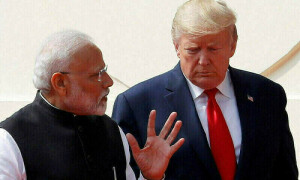THE Special Investment Facilitation Council (SIFC) is a civil-military initiative to cut red tape and create an investment climate conducive to new investment. For long, the silo-working of ministries, fragmentation between the federation and provinces and U-turns in policies have combined to hurt business. So has weak political will to take courageous actions to level the playing field with the informal sector.
Indeed, there is a perverse consensus among political parties to retain the status quo on a narrow tax base, loss-making SOEs, circular debt and high government expenditure. IMF programmes have also been short-sighted in setting front-loaded targets that address the symptoms instead of the root causes.
Tax targets set by the IMF are met by taxing the taxed, not by broadening the tax base. Energy tariffs are raised to manage the circular debt instead of addressing the causes — inadequate transmission, inefficiencies and theft.
However, the IMF is not to be blamed for our apathy. By failing to mobilise resources to invest meaningfully in human capital, Pakistan ranks at the bottom in South Asia in virtually every socioeconomic measure. Even more serious, not only does the country suffer from twin deficits on external and fiscal accounts, we now have a third deficit: one of trust within and between institutions. In this scenario, the SIFC is not a solution looking for problems; there are plenty of them to sort, foremost among which are fiscal and energy policies.
Consistency has never been the hallmark of Pakistan’s fiscal policy. To successfully create an investment-friendly climate, the SIFC will need to ensure equitable and consistent tax policies. Corporate investors must not be taxed at rates higher than unincorporated businesses.
Taxpayers, especially listed companies, should not be required to pay minimum tax on turnover, and neither should businesses in SEZs during their tax holiday period. As businesses that grow, their taxable profit also generates higher tax revenues; they must not be penalised through the super tax. Once a tax concession is given, it should not be withdrawn before the expiry of the term.
A professionally resourced SIFC is a pragmatic solution.
Tax provisions governing the formation of groups through holding companies were first introduced in 2008. They were withdrawn in 2016, restored in 2019 and withdrawn again in 2021.
As a result, contrary to global practice, intercorporate dividends are taxed at multiple levels, raising the effective tax rate for shareholders in holding companies. This impedes the scale and widening of shareholding. Taxpayers must not be harassed. Wealth creation should be respected and encouraged.
Cash in circulation which represents 28 per cent of the money supply and is used to evade taxes must be discouraged. Industry, which represents 20pc of GDP cannot continue to be burdened with 56pc of taxes while retail and wholesale contribute significantly below their share of GDP.
Agriculture and urban properties need to be taxed. Under-invoicing must be curbed, like smuggling has now started to be. Misuse of the Afghan transit trade which denies tax revenues and impacts domestic manufacturing must be controlled.
Energy tariffs for industry the world over are lower than for other consumers. In Pakistan, industrial tariff is loaded with charges for unutilised generation capacity, line losses, theft, non-recovery and cross subsidies. As a result, industry is rendered uncompetitive and fresh investment in energy-intensive sectors such as petrochemicals remains unfeasible.
With unutilised generation capacity, especially in winter, lower tariffs for industry can help absorb capacity charges. Justification for industrial tariff should be based on the positive contribution of industry to jobs, tax revenue, exports and import avoidance.
“Things fall apart, the centre cannot hold” is how Yeats described a state of helplessness. A professionally resourced SIFC is a pragmatic solution that can remove the sense of helplessness prevailing in the country.
Its success should not be measured just by the number or size of investments but by the change it brings in the investment climate and how quickly it institutionalises better ways of working and renders itself obsolete.
The best ambassadors of investment are existing investors. Foreign investors seldom enter sectors that local investors shy away from.
There are some other points. SIFC must focus on sectors generating exports or reducing imports. Pakistan’s food security must be prioritised. Joint ventures and partial sale will ensure that a part of future profits stay in the country. Strategic interests such as mining should be protected.
Investors must also bring new technology and knowhow. Competitive bidding will strengthen credibility and improve inflows. For all this, the SIFC will need professional resources.
The writer is CEO of the Pakistan Business Council.
Published in Dawn, September 23th, 2023
















































Dear visitor, the comments section is undergoing an overhaul and will return soon.